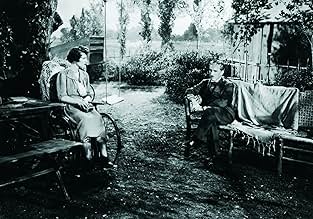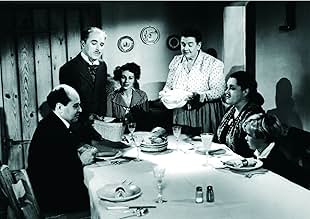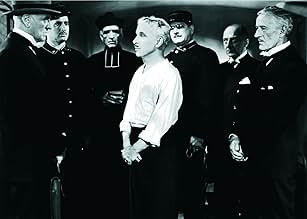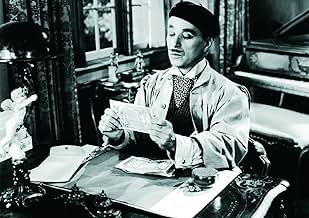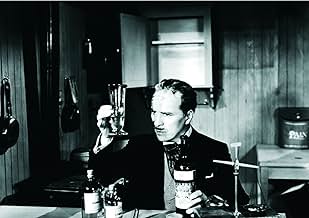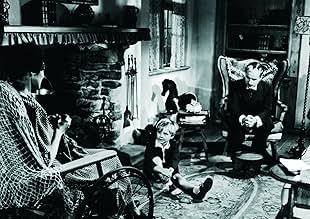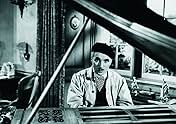VALUTAZIONE IMDb
7,8/10
20.003
LA TUA VALUTAZIONE
Un uomo gentile ma cinico sostiene la sua famiglia sposando e uccidendo donne ricche per i loro soldi, ma il lavoro presenta alcuni rischi professionali.Un uomo gentile ma cinico sostiene la sua famiglia sposando e uccidendo donne ricche per i loro soldi, ma il lavoro presenta alcuni rischi professionali.Un uomo gentile ma cinico sostiene la sua famiglia sposando e uccidendo donne ricche per i loro soldi, ma il lavoro presenta alcuni rischi professionali.
- Regia
- Sceneggiatura
- Star
- Candidato a 1 Oscar
- 6 vittorie e 1 candidatura in totale
Ada May
- Annette - Her Maid
- (as Ada-May)
Bernard Nedell
- Prefect of Police
- (as Bernard J. Nedell)
Recensioni in evidenza
... not that he made that many of them.
Chaplin plays Henri Verdoux, a man who goes about marrying and then killing upper middle class middle-aged women for their money and property. If he was known to be around at the time of their death, he disposes of their bodies in such a way that they will never be found. If he was not known to be around, then he doesn't bother to dispose of their bodies and just takes the cash he needs with him, leaving like he was never there.
It's awhile before it is revealed that Verdoux was what we now call "laid off" from his job at a bank after 30 years during the Depression that gripped Europe after WWI and as a result of that he is on a tear, married to multiple soon to be murder victims at a time, in order to provide for his actual crippled wife and child and eventually retire from this sordid business.
You never actually see Chaplin do any violence. That would just be too stunning of an image. So everything is insinuated, such as him disposing of the property of a recently deceased wife while the incinerator out back has been going full steam for three days. Martha Raye plays one of Verdoux's more annoying and lively wives, and if you think she is too good of a comedienne for Verdoux just to visit and abruptly kill her, you'd be right. His near attempts are hilariously disrupted, including one attempt that is stopped by a group of yodlers with binoculars. Will he eventually be successful? I'd say watch and find out.
In the parts of the film where Chaplin combines action, slapstick, and dialogue, the production is outstanding. At the end where he relies more on dialogue alone, I wouldn't say it drags, but I would say it is a bit "off". I get that Chaplin is trying to compare the furor that is created over the murder of a dozen people by a serial killer to society's indifference over millions dying as a result of war or famine, but I think the rather sentimental one liners he throws out blunt and muddle his message considerably.
Chaplin plays Henri Verdoux, a man who goes about marrying and then killing upper middle class middle-aged women for their money and property. If he was known to be around at the time of their death, he disposes of their bodies in such a way that they will never be found. If he was not known to be around, then he doesn't bother to dispose of their bodies and just takes the cash he needs with him, leaving like he was never there.
It's awhile before it is revealed that Verdoux was what we now call "laid off" from his job at a bank after 30 years during the Depression that gripped Europe after WWI and as a result of that he is on a tear, married to multiple soon to be murder victims at a time, in order to provide for his actual crippled wife and child and eventually retire from this sordid business.
You never actually see Chaplin do any violence. That would just be too stunning of an image. So everything is insinuated, such as him disposing of the property of a recently deceased wife while the incinerator out back has been going full steam for three days. Martha Raye plays one of Verdoux's more annoying and lively wives, and if you think she is too good of a comedienne for Verdoux just to visit and abruptly kill her, you'd be right. His near attempts are hilariously disrupted, including one attempt that is stopped by a group of yodlers with binoculars. Will he eventually be successful? I'd say watch and find out.
In the parts of the film where Chaplin combines action, slapstick, and dialogue, the production is outstanding. At the end where he relies more on dialogue alone, I wouldn't say it drags, but I would say it is a bit "off". I get that Chaplin is trying to compare the furor that is created over the murder of a dozen people by a serial killer to society's indifference over millions dying as a result of war or famine, but I think the rather sentimental one liners he throws out blunt and muddle his message considerably.
As Charlie Chaplin put it when the tramp finally talked in The Great Dictator the magic was gone. Chaplin felt he had to come up with another character in order to continue his career and he got away from the lovable Little Tramp as far as he could with Monsieur Verdoux.
A whole lot of people were shocked when Monsieur Verdoux came out and instead of the Tramp we got a Bluebeard murderer. Black comedy was not a genre popular in the USA at that time and a lot of people hated this film. None more so than Hollywood columnist Hedda Hopper who as a good conservative Republican cheered on the coming blacklist and beat the drums for Chaplin's deportation. No accident that Chaplin was hauled before the House Un-American Activities Committee at the time Monsieur Verdoux came out.
Based on the famous French mass criminal Henry Desire Landru, Monsieur Verdoux tells the story of a bank clerk who lost his job and to support his family started marrying and murdering rich women. Verdoux keeps quite a schedule because he's marrying several of them at the same time. But always returns to wife Mady Correll and son Allison Roddan.
Funniest marriage is to Martha Raye who not only is he unsuccessful in killing, she nearly does him in on a couple of occasions strictly by accident. That raucous laugh might elicit sympathy from a jury if anyone ever heard it and was condemned to live with it even part time.
With the marriage to Raye comes the film's funniest sequence Chaplin trying to kill Raye when they were in a boat on a lake in Switzerland. It will not escape your attention that the sequence is borrowed from Theodore Dreiser's An American Tragedy which was already filmed in 1931 and would shortly be filmed again in 1951 as A Place In The Sun. Ironic indeed how the same plot gambits can be played for laughs or deadly serious.
Second funniest is Raye showing up at Chaplin's wedding to Isobel Elsom whom he has targeted. It forces him to leave her at the altar not knowing at that time how lucky she was.
Truth be told some of Chaplin's left wing political views are grafted into the film somewhat forcibly. It's what got Hedda Hopper's undergarments in such a twist. Still this an amusing film and not fairly judged by a lot of people at the time it came out.
A whole lot of people were shocked when Monsieur Verdoux came out and instead of the Tramp we got a Bluebeard murderer. Black comedy was not a genre popular in the USA at that time and a lot of people hated this film. None more so than Hollywood columnist Hedda Hopper who as a good conservative Republican cheered on the coming blacklist and beat the drums for Chaplin's deportation. No accident that Chaplin was hauled before the House Un-American Activities Committee at the time Monsieur Verdoux came out.
Based on the famous French mass criminal Henry Desire Landru, Monsieur Verdoux tells the story of a bank clerk who lost his job and to support his family started marrying and murdering rich women. Verdoux keeps quite a schedule because he's marrying several of them at the same time. But always returns to wife Mady Correll and son Allison Roddan.
Funniest marriage is to Martha Raye who not only is he unsuccessful in killing, she nearly does him in on a couple of occasions strictly by accident. That raucous laugh might elicit sympathy from a jury if anyone ever heard it and was condemned to live with it even part time.
With the marriage to Raye comes the film's funniest sequence Chaplin trying to kill Raye when they were in a boat on a lake in Switzerland. It will not escape your attention that the sequence is borrowed from Theodore Dreiser's An American Tragedy which was already filmed in 1931 and would shortly be filmed again in 1951 as A Place In The Sun. Ironic indeed how the same plot gambits can be played for laughs or deadly serious.
Second funniest is Raye showing up at Chaplin's wedding to Isobel Elsom whom he has targeted. It forces him to leave her at the altar not knowing at that time how lucky she was.
Truth be told some of Chaplin's left wing political views are grafted into the film somewhat forcibly. It's what got Hedda Hopper's undergarments in such a twist. Still this an amusing film and not fairly judged by a lot of people at the time it came out.
A suave but cynical man (Charles Chaplin) supports his family by marrying and murdering rich women for their money, but the job has some occupational hazards.
This film is brilliant, because it is not just entertaining, but also has a strong message. On the surface, it is a man who marries women and kills them in order to get their money. This in itself makes for a good film (and is somewhat risqué for the 1940s). But then, it is also a metaphor for society -- capitalism, imperialism, war... Chaplin takes on the Great Depression and the war industry.
Most people know Chaplin for his silent films and tramp character, but he really became a strong filmmaker in his later years. This film, along with "Great Dictator" and "King in New York" are among his best works. It is a shame that for whatever reason he is not remembered for the second half of his career.
This film is brilliant, because it is not just entertaining, but also has a strong message. On the surface, it is a man who marries women and kills them in order to get their money. This in itself makes for a good film (and is somewhat risqué for the 1940s). But then, it is also a metaphor for society -- capitalism, imperialism, war... Chaplin takes on the Great Depression and the war industry.
Most people know Chaplin for his silent films and tramp character, but he really became a strong filmmaker in his later years. This film, along with "Great Dictator" and "King in New York" are among his best works. It is a shame that for whatever reason he is not remembered for the second half of his career.
A brilliant and funny film. Some have even called this Chaplin performance the greatest acting in the history of film. This film came out long before the term serial killer was even a thing. Here the term is mass killer, and it's also hard to argue with his character's assessment that governments of the world are truly the biggest of all mass killers, (Now referred to as serial killers.). In typical Chaplin fashion, this film often challenges and questions the integrity of various powers/authorities and even capitalism itself. Truly though this is sort of a sweet film at it's heart, as most Chaplin films are. A dark comedy with heart, but in truth I feel this film is much more than a dark comedy. There is a much grander subtle narrative in this film. Many a well known critic even have often drastically underrated the writing, the in fact brilliant storytelling of Chaplin. He was in truth one of the first great master storytellers in the history of film, and he really doesn't often get the credit he deserves in this regard. He is more known for his comedic brilliance and comedic writing, but overall the man was extremely brilliant and talented beyond measure. Storytelling itself was really Chaplin's greatest talent in my view. Not just in the comedic sense, but in an intellectual sense. To me, this is definitely an intellectual film even much more than it is a dark comedy, and overall one of Chaplin's greatest films.
"Despair is a narcotic. It lulls the mind into indifference." - Henri Verdoux (Chaplin)
If you like mature classic films at all, then you definitely should see Monsieur Verdoux. It's simply a brilliant piece of 1940's art. 9/10.
"Despair is a narcotic. It lulls the mind into indifference." - Henri Verdoux (Chaplin)
If you like mature classic films at all, then you definitely should see Monsieur Verdoux. It's simply a brilliant piece of 1940's art. 9/10.
Considered in some circles as Chaplin's crowning performance. It's a clever and earnest study of a man, a survivalist in a world gone the way of a corporate jungle. It also becomes incredibly relevant now in its take on the ruthlessness of capitalism and harshness of being part of a civilised society. Take allegory on its face value, Chaplin's Henri Verdoux is a bluebeard, who marries middle-aged women for their money and disposes of them through incinerators or "liquidates them" as he prefers to call it. His actions are driven by a need to care for a young child and an invalid wife who look up to him, as he keeps from them his retrenchment from his post as a bank clerk. He sees no difference in murder as he does in business. There's an inconsolable sadness throughout the film. Despite the gags, and wit teeming within its situations and characters, all roads lead to despair. The cold reach of its cynicism is daunting as it is bleak.
The film presents incongruities to the calculatingly agreeable monster by showing an aging man whose waning pride demands attention, and a hopeless romantic who surmises that he's a singular creature in a cold, inhuman world. The film then shows how arctic and precise he is when it comes to murder, how meticulous he is when he plans and how efficient he is when it comes to counting francs - cue the sight gag.
His articulation is almost borne out of being made to play different roles, the confidence he exudes to charm these women into marriage are just facets of Verdoux's intelligence. Above all, he assumes he knows how these women think and what they truly are. His misogynistic tendencies towards women who are self-sufficient is in clear contrast to his wife, who he adores and the ingénue in the street he picks up halfway through the film who restores his faith in humanity when she turns out to be an optimistic but kindred spirit.
With the film's final minutes, Chaplin indicts big business within the film's context of being in the Great Depression. He uses this opportunity to verve into anti-war criticism, a keenly placed insight being released just a few years after the end of the second World War. Insisting he's nothing but an amateur compared to the murderers behind war and business machinations, he uses the furious revolutions of the wheels of a train to show like in like many of his silents, that he's nothing but a cog - always turning to the tune of the corporations.
The film presents incongruities to the calculatingly agreeable monster by showing an aging man whose waning pride demands attention, and a hopeless romantic who surmises that he's a singular creature in a cold, inhuman world. The film then shows how arctic and precise he is when it comes to murder, how meticulous he is when he plans and how efficient he is when it comes to counting francs - cue the sight gag.
His articulation is almost borne out of being made to play different roles, the confidence he exudes to charm these women into marriage are just facets of Verdoux's intelligence. Above all, he assumes he knows how these women think and what they truly are. His misogynistic tendencies towards women who are self-sufficient is in clear contrast to his wife, who he adores and the ingénue in the street he picks up halfway through the film who restores his faith in humanity when she turns out to be an optimistic but kindred spirit.
With the film's final minutes, Chaplin indicts big business within the film's context of being in the Great Depression. He uses this opportunity to verve into anti-war criticism, a keenly placed insight being released just a few years after the end of the second World War. Insisting he's nothing but an amateur compared to the murderers behind war and business machinations, he uses the furious revolutions of the wheels of a train to show like in like many of his silents, that he's nothing but a cog - always turning to the tune of the corporations.
Lo sapevi?
- QuizVerdoux's quote "One murder makes a villain; millions a hero" is taken from the abolitionist Bishop Beilby Porteus (1731-1808).
- BlooperWhen Monsieur Verdoux states the area of the house being sold he mentions the lengths in feet. As the film is set in France, he should have used meters.
- Citazioni
Henri Verdoux: Wars, conflict - it's all business. One murder makes a villain; millions, a hero. Numbers sanctify, my good fellow!
- Versioni alternativeThe West German theatrical version was cut by approximately 15 minutes.
- ConnessioniFeatured in Amore a prima svista (2001)
I più visti
Accedi per valutare e creare un elenco di titoli salvati per ottenere consigli personalizzati
- How long is Monsieur Verdoux?Powered by Alexa
Dettagli
- Data di uscita
- Paese di origine
- Siti ufficiali
- Lingue
- Celebre anche come
- A Comedy of Murders
- Luoghi delle riprese
- Azienda produttrice
- Vedi altri crediti dell’azienda su IMDbPro
Botteghino
- Budget
- 2.000.000 USD (previsto)
- Lordo Stati Uniti e Canada
- 64.636 USD
- Lordo in tutto il mondo
- 65.718 USD
- Tempo di esecuzione2 ore 4 minuti
- Colore
- Proporzioni
- 1.37 : 1
Contribuisci a questa pagina
Suggerisci una modifica o aggiungi i contenuti mancanti

Divario superiore
By what name was Monsieur Verdoux (1947) officially released in India in English?
Rispondi

